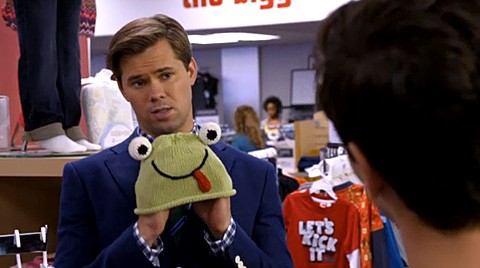BY JOHN WELTMAN
A surrogacy expert's continuing look at issues in NBC's 'The New Normal'.
“So… this baby is going to be the greatest thing that ever
happened to us, right?” Bryan asks David in this week's episode of The New
Normal. “It's our little miracle. So when can we start enjoying it?”
Having a baby means embracing some uncertainty. It's one of
the most important events in a parent's life, and yet, it is impossible to
predict exactly how it will play out. This goes for straight couples, who
conceive with or without the use of assisted reproductive technology, as well
as for gay couples. And it holds especially true for those who have children
through surrogacy.
David and Bryan show two different approaches to handling
this uncertainty. Excited and eager to move forward and get ready for their
future child, Bryan buys baby clothes before the first ultrasound. David—unsurprisingly, the measured
doctor—is more
cautious, reminding Bryan of all the remaining pregnancy tests and of their
agreement not to buy any clothes before all they have received the results.
Here are two different responses, both reasonable. David is
right to exercise caution. Pregnancy is unpredictable. For those who pursue
surrogacy or utilize in vitro fertilization, there is no guarantee that a given
embryo transfer will be successful. There is no guarantee that an egg retrieval
will yield a sufficient number of quality eggs. Sometimes, there is a need to
make adjustments along the way. Communication with an IVF physician can help
couples who choose surrogacy understand the big picture.
At the same time, too much caution can stifle the joy of the
surrogacy experience. Taking time to enjoy the process is important, as David
comes to realize as the episode draws to a close. “So, even though it's not
going to be easy, I need to try to celebrate the wins,” he tells Bryan. “Like
when we heard that heartbeat yesterday, I don't think
I've ever loved you more, because that—that was the sound of our family.” The
depiction of love between the intended fathers in this moment is perhaps the
most poignant and genuine we have seen in the show thus far.
 At the opposite extreme of the
At the opposite extreme of the
emotional spectrum is the scene in the store. While they are shopping with
Goldie and Shania, Bryan and Davis share a kiss. A man walking by with his
family asks them to stop, and calls them “disgusting.” David wants to ignore
him, but Bryan responds, “Thanks for your intolerance and your bigotry and for
fostering this ignorance in another generation.” The message was clear enough
that the collective social conscience of much of the world hasn't advanced as
quickly as the scientific and medical achievement that has made surrogacy possible.
The scene brings up the issue of how gay couples should
respond to ignorance and how, as parents, we need to address intolerance when
our children are faced with it just because they have two dads or two moms.
Bryan is concerned about how he and David will respond when their child faces
the same bigotry they experienced in the store.
My husband and I shared these concerns. These are good
conversations to have. We were worried that our children would be bullied for
having gay fathers. Surprisingly, in the eighteen years since we had our first
child through surrogacy, we have rarely found the prejudice we anticipated. We've been fortunate. We have supportive
families, friends, and some of the best neighbors in the world. My hope is that
every LGBT family should be so fortunate, but this is sadly not the
case.
Gay couples considering having
children should anticipate all of these issues. The surrogacy process
has highs and lows. And these highs and lows continue after the birth. Gay
couples in the process of becoming parents through surrogacy should talk about
how they will address bullying and prejudice, and intolerance should they come
up.
Before Cliff and I had children, we went to a lecture
given by April Martin, who wrote the Lesbian
and Gay Parenting Handbook. She said her kids had learned the “stupid”
lesson: some people (the bigoted ones, of course) are just plain stupid. Try it. It
helps and it works when it comes to keeping kids confident on themselves and on
their families.
John Weltman is the president and founder of Circle Surrogacy and an expert in assisted reproductive technology law. He and his husband are the fathers of two sons, 18 and 17, through surrogacy. They were the first in America to have two children through surrogacy, one from each dad, through the same surrogate mom.
Have your children experienced bigotry because of their gay
parents? What are your strategies for addressing it? I'd love to hear from you
in the comments below.
Earlier in this series…
Surrogacy Expert Weighs in on 'The New Normal' [tlrd]




